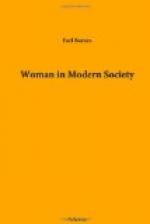In matters of institutional regulation by government, women are at least as vitally interested as men. In all that touches the family, marriage, or divorce, women have more at stake than men; and there are as many wives as husbands involved. The schools are also nearer to women than to men; more girls than boys attend them; more women are teachers; and more women than men are interested parents of school children. The church is also more vital to women to-day than to men. On the side of industries, it is clear that our 8,000,000 independent wage-earning women have a desperate stake in all governmental action touching the regulation of working conditions. In whatever concerns general sanitation, safe water, and pure foods, all are equally interested who must breathe and eat to live. Surely the need of women for political protection is quite as great as that of men.
In the matter of forming political judgments, not even the wisest men are beyond improvement. International affairs, monetary systems, the best way of raising taxes, and similar problems, often divide the male electorate pretty evenly into rival parties. Since both cannot be right, a great deal of poor political thinking must be done by the present body of voters. Meantime, women are showing their ability to deal intelligently with all sorts of subjects in our educational institutions, in business and in social life. Their judgments command respect in every other field; and it is hard to see why they could not apply their powers to political questions.
We must remember, too, that during these last years the field of political life has been rapidly broadening, through the awakening of social consciousness among the people. To concern one’s self with politics now is to be interested in good market facilities, in rapid transit for cities, in recreation centers for children, in honest labelling of food products, in reformation of criminals, in preventing marriage among the unfit, and in a hundred similar matters. Here women will doubtless bring us a strong addition to our political efficiency. They have long been considered the natural directors of social life and, in spite of being disfranchised, they mainly handle such matters at present. Now that these subjects are being brought into the political field, women should follow them there, as they have followed their industries from the homes into the factories. There is no reason to believe that their judgments will be less sound than those of their brothers and husbands.
Of course, women’s knowledge of means and methods is much less than that of men in their own class. Not only have they not participated in political life, but they have been steadily warned away from that particular tree of knowledge. Yet the present generation of women has gone through the same preliminary education in schools with its brothers; and many women in high schools and colleges have made a more extended study of political institutionalism. Still more important, more than a million women have been educating themselves for some years in this direction through voluntary associations of some kind; while in most States they have had some political practice through limited suffrage, and in a few States full experience.




